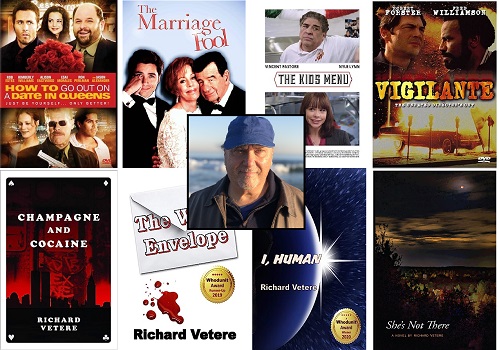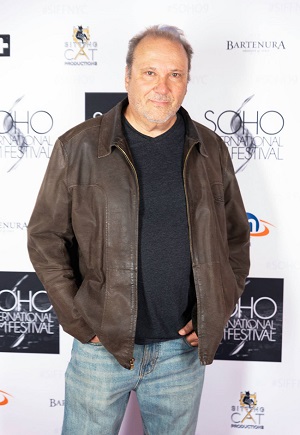 Interview by Tiziano Thomas Dossena
Interview by Tiziano Thomas Dossena
Richard Vetere is a playwright, novelist, poet, and film and TV writer, actor, director, and producer. His most known work is The Third Miracle, published by Simon & Schuster, for which he co-wrote the screenplay adaptation for the movie starring Ed Harris, directed by Agnieszka Holland, produced by Francis Ford Coppola and released by Sony Picture Classics. Vetere’s professional teaching credits include NYU, Queens College, the New School at Lang College, and Montclair State University.
L’Idea Magazine: Hello Richard. You have written novels, poetry, plays, and screenplays, and had a lot of success with all of them. The Italian American community is very proud of you. Would you say that being Italian American influenced a lot your writing as well as your life choices?
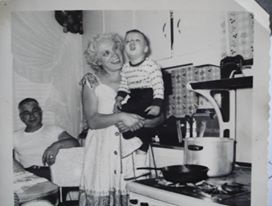
Richard Vetere: Growing up Italian American in the 1950s meant that I grew up a practicing Catholic, that I had a big family on both sides and I had a Catholic education. My parents taught me to value family and friends and to treat all people, including women, with respect and dignity. However, I was not told anything at all about Italy itself nor did anyone speak Italian in my family. I was an outsider on two fronts. Being a poet, my mainly Italian American working-class friends, who did not spend much time reading books, always respected me being a poet, and my Jewish friends in the literary world, always respected my working-class roots. But the best perspective came when I was writing a film in Rome for Italian director Giacomo Battiato. He told me I was a combination of American know-how in my ability in getting things done, and Italian artistry with my love for the arts. He was correct.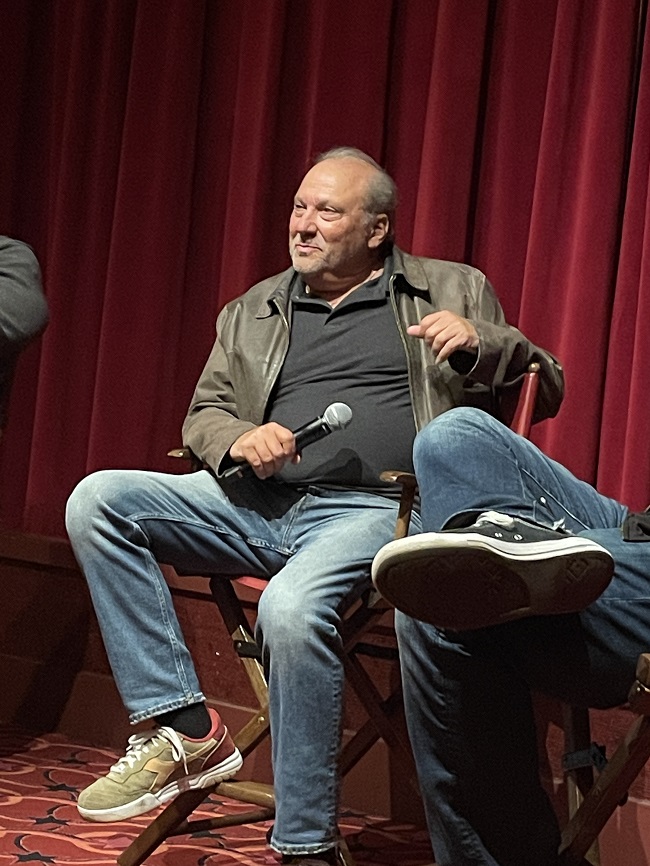
L’Idea Magazine: What do you believe is the most significant characteristic of Italians and Italian Americans?
Richard Vetere: I will have to focus on the greats. Caravaggio, Pirandello, Fellini, Coppola, Scorsese, Pacino. What do they all have in common over the centuries? They all see the world with a sharp and accessible vision. They break boundaries, they live art as an essential of their very nature. They contribute mightily to the belief that humanity has great worth. I try hard to do the same with my work. Italians and Italian Americans share this effort to make something of value out of our struggles.
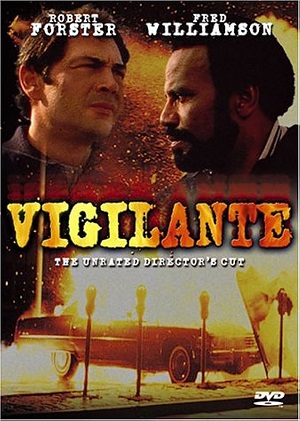 L’Idea Magazine: You wrote the screenplay for many movies and TV adaptations, among which “Vigilante,” called “one of the best indies of the 1980s” by BAM. Did you write the screenplay as an original, or was it a novel first? It was the 20th-grossing film the year it was released, a super-success for an indie movie. What do you believe made it so successful?
L’Idea Magazine: You wrote the screenplay for many movies and TV adaptations, among which “Vigilante,” called “one of the best indies of the 1980s” by BAM. Did you write the screenplay as an original, or was it a novel first? It was the 20th-grossing film the year it was released, a super-success for an indie movie. What do you believe made it so successful?
Richard Vetere: Vigilante is an original screenplay that I was hired to write by director/producer William Lustig after he saw a workshop production of my play Rockaway Boulevard at the Actors Studio back in 1978. I wrote the film when NYC was mired in crime and inertia on how to deal with that crime, something like what is going on today, though not as bad. I was shocked that neither the police nor the politicians had the will to stop it. So, I wrote a visceral story about a man whose family suffers at the hand of a random crime, which is the murder of his son by a street gang. The rest of the story is about how he struggles with his desire for revenge. The movie is scene by scene how I wrote it. It continues to have a cult following. Some of my lines of dialogue are quoted on the internet. I went to two screenings of the movie in two different theaters this past year in NYC and fans packed both theaters.
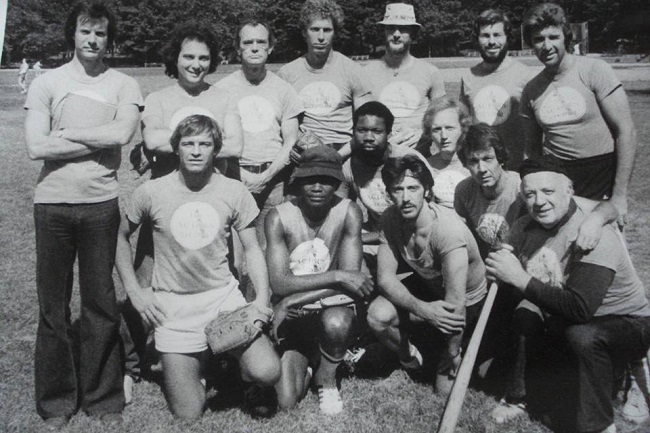
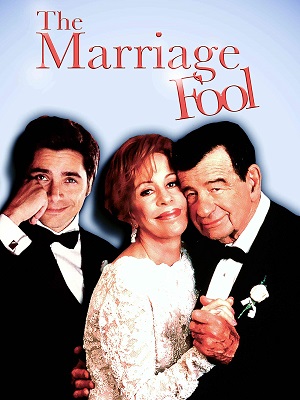 L’Idea Magazine: Your Off-Broadway production of “The Marriage Fool” was made into a CBS television movie starring Walter Matthau, Carol Burnett, John Stamos, and Teri Polo and it was the highest-rated TV movie in 1998. It has been released for streaming in 2021 and I highly recommend it. What inspired you to write this story?
L’Idea Magazine: Your Off-Broadway production of “The Marriage Fool” was made into a CBS television movie starring Walter Matthau, Carol Burnett, John Stamos, and Teri Polo and it was the highest-rated TV movie in 1998. It has been released for streaming in 2021 and I highly recommend it. What inspired you to write this story?
Richard Vetere: My father was dying and I wanted to capture our conversations about my never marrying and his being married to my mother for over thirty years. I also wanted to capture the distinct way he spoke. Also, my brothers and I were always concerned if my father could take care of himself if my mother died first. So that was my original premise, my father surviving my mother. I wrote it as a one-act play and I thought I was done with it. It was performed at Circle Rep with Farley Granger playing my father. After each show, Farley would come to me backstage pushing me to expand the play and I did! It was amazing to have Walter Matthau play my father and John Stamos play me in the CBS TV movie. My mother felt Walter captured everything about my father. Of course, Carol Burnett is Walter’s love interest. They were all great fun to work with.
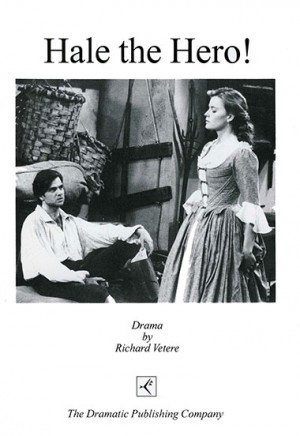 L’Idea Magazine: Another of your plays, “Hale the Hero!”, was aired on television by ‘A&E General Motors Plays Theater Series’ in 1994. What was the theme of this play?
L’Idea Magazine: Another of your plays, “Hale the Hero!”, was aired on television by ‘A&E General Motors Plays Theater Series’ in 1994. What was the theme of this play?
Richard Vetere: When I had read that Nathan Hale said the famous words “I regret that I have but one life to lose for my country,” I was skeptical. At such a young age there was no way I would dance to the gallows saying those very words. I would want to live! So, using this premise, I made Hale (played by Kevin Anderson) a modern-day young man waiting for his execution. In my story, it is General Washington who sends a pretty revolutionary woman (Elisabeth Shue) to bring these immortal words to Hale to say. I was so fortunate that The General Motors Playwrights Theater Series picked my show and I got lucky that we went first in the new season affording us a nice budget to build that gorgeous green house where Hale was kept waiting for his execution in the Turtle Bay section of Manhattan. The play ends with the famous words we all know but I wrote the speech that Hale says that leads up to those famous last words. Lauren Bacal introduced the play to the TV audience. And as she stated, it was an anti-war play in the finest sense of the word. “It is young men who are always sent to die,” she stated. My producer Glady Neederlander told me that General Norman Schwarzkopf told her he thought that Hale the Hero! was a wonderful anti-war play. You can find it now playing on U-Tube.
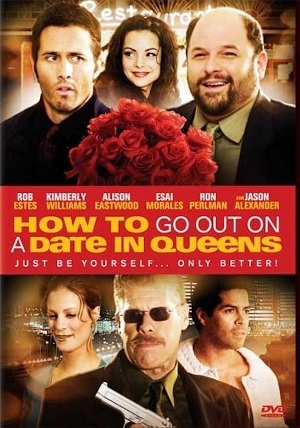 L’Idea Magazine: And then again, “How to Go on a Date in Queens” was made into a movie with a cast of comedic actors such as Jason Alexander, Kimberly Willams, Ron Perlman, and Rob Estes. Do you find the inspiration for these plays from your life in Queens?
L’Idea Magazine: And then again, “How to Go on a Date in Queens” was made into a movie with a cast of comedic actors such as Jason Alexander, Kimberly Willams, Ron Perlman, and Rob Estes. Do you find the inspiration for these plays from your life in Queens?
Richard Vetere: A small theater company asked me to write a play for them. I sat down and wrote the title and realized that was the theme of the play. It was great fun to write. That theater company produced it in New York and then well-respected theater director Larry Moss produced and directed it in his theater in Santa Monica where it was a hit and ran for several months. Michele Danner saw it and decided to produce and direct it as her first feature. I got a wonderful cast. The opening night in LA was also great fun.
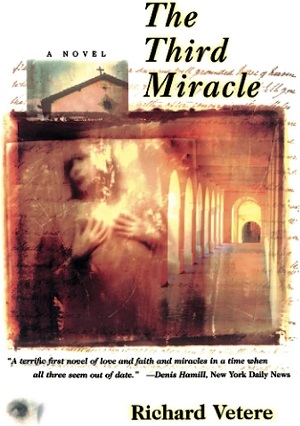 L’Idea Magazine: Your novel “The Third Miracle” was published in 1997 and was translated into several languages. The novel was selected for The Book of The Month Club in Spain and Poland. A film based on that novel was produced by Francis Ford Coppola, directed by Agnieska Holland, starring Ed Harris and Anne Heche, and released in 2000. In 2008, The Third Miracle was presented at the Museum of Modern Art (MOMA) in New York City, highlighting Agnieszka Holland’s body of directorial work. Could you tell us more about this novel? {brief synopsis}. What inspired you to write it?
L’Idea Magazine: Your novel “The Third Miracle” was published in 1997 and was translated into several languages. The novel was selected for The Book of The Month Club in Spain and Poland. A film based on that novel was produced by Francis Ford Coppola, directed by Agnieska Holland, starring Ed Harris and Anne Heche, and released in 2000. In 2008, The Third Miracle was presented at the Museum of Modern Art (MOMA) in New York City, highlighting Agnieszka Holland’s body of directorial work. Could you tell us more about this novel? {brief synopsis}. What inspired you to write it?
Richard Vetere: Sometime in the mid-1980s, I was having a conversation with a good friend Rudy Marinelli where he brought to my attention that the word miracle was not used much and many people did not believe in them. That is hard to imagine now but it was true then. So the very next night I went to Saint John’s University Library to research miracles and found, by chance, a thin black book titled The Ordinary Process of Canonization. The opening sentence was something like “A priest, the postulator, will be assigned by the Vatican to investigate the heroic virtue of the said candidate for sainthood. This postulator will act as a spiritual detective.” I was hooked. That was the theme and story of my entire novel. I created Father Frank Moore the next day and wrote the first one hundred and fifty pages that week. Though I rewrote the novel over ten years, those original pages never changed. Eventually, my agent at William Morris got my novel to its first publisher Carol & Graff and then Simon & Schuster picked up the rights for Scribners. My agent got it to Coppola then to Ed Harris and Anne Heche and director Agneiszka Holland. When it screened at the Toronto Film Festival I sat with Ed and we were both taken in by the audience’s wonderful response. Roger Ebert gave it a thoughtful and powerful review. “It is a story about a man doing his job,” he wrote.
L’Idea Magazine: Did you also write the score, besides the lyrics, for the musical “Be My Love: The Mario Lanza Story,” about the life of singer Mario Lanza. Could you tell us more about this experience?
Richard Vetere: Producers Sonny Grosso, Phil Ramone, and Pierre Cossett commissioned me to write the stage play, to use as the book for Lanza’s famous songs. Sadly, they are all gone now. In my story, Lanza is haunted by the ghost of Caruso. The best productions I saw of the play were at the Tillis Center here in NY and at the University of Miami. I actually wrote and published several poems I wrote about Lanza from his point of view. Every once in a while, someone writes to me about the play.
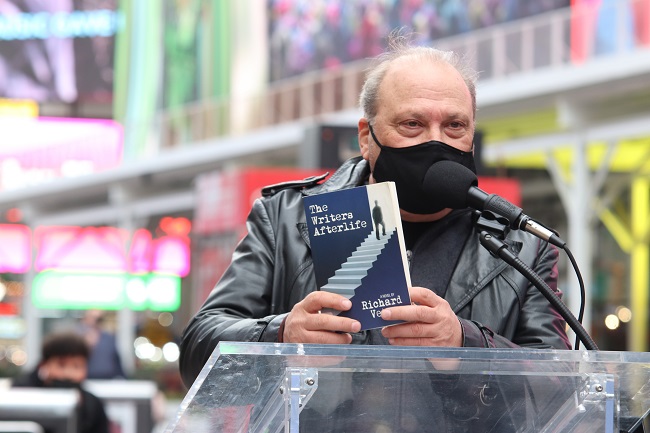
L’Idea Magazine: Can you tell us about your book “The Writers Afterlife”, and what inspired it?
Richard Vetere: I had read an article in Arts & Leisure Daily about how Van Gogh became famous after his death. It was a simple but extraordinary story since he never sold a painting. So, I did some research on Kafka, Emily Dickenson, Edgar Allen Poe, and even Shakespeare, and I learned how fame, which is defined in the Bible as “your name stretched out through time” happened for them after their deaths. So, I concocted the notion that there was a place writers go after they die but unless they are famous on earth they cannot dwell with the Immortals. I used Shelly’s notion about the Immortals that he used in his poem about Keats after he died. Writing that Keats is now dwelling with the Immortals. Wanting to explore why some people become famous in their lifetimes and others only after they have died, I created a character Tom Chillo who dies at the tender age of 44 and goes to The Writers Afterlife. He dies in the opening sentence of the novel and several critics wrote that it has one of the best opening lines of any novel “I died today in my T-shirt and jeans at my computer.” Critics also wrote that The Writers Afterlife is a novel all writers should read. I am considering adapting it for the stage. I’d love to see it as a movie.
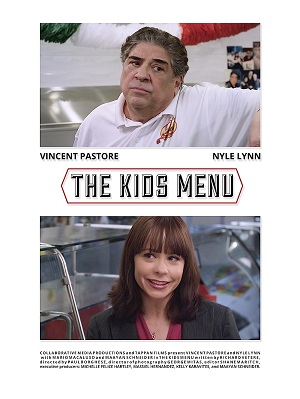 L’Idea Magazine: “The Kids Menu” is another of your plays that was turned into a movie. It’s a hilarious comedy. It’s all based in Brooklyn, and it shows the difference in life approach of distinct generations. Were you inspired by real events or just observations?
L’Idea Magazine: “The Kids Menu” is another of your plays that was turned into a movie. It’s a hilarious comedy. It’s all based in Brooklyn, and it shows the difference in life approach of distinct generations. Were you inspired by real events or just observations?
Richard Vetere: I had read a story about a pizza store owner who didn’t want a kid’s menu in his long-time family pizza parlor and a woman in the upscale Brooklyn neighborhood who confronted him with legal action if he didn’t create one. The story gave me an opportunity to dramatize old-way Italian American values confronted by the new-world values of Yuppies. It was immediately published and then made into a short film starring Vincent Pastore who played Big Pussy in The Sopranos. People love it because it shows someone sticking to their beliefs and not changing just for change’s sake.
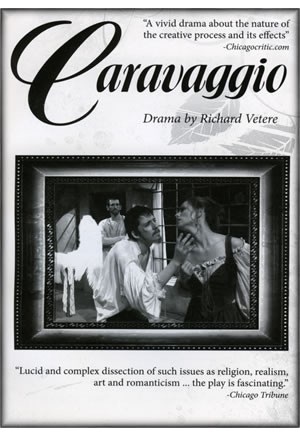 L’Idea Magazine: You also wrote many other plays, such as “The Engagement,” “Coupla Bimbos Sittin’ Around Talkin,” “Gangster Apparel,” “Caravaggio,” “Machiavelli,” “Bird Brain,” and “One Shot, One Kill.” They were performed Off-Broadway in NYC, Chicago, Melbourne, Cyprus, Rome, Paris, and London. A big achievement. Being so successful at writing, and sometimes directing plays, do you feel any of these plays will ever be on Broadway? Caravaggio was also translated into Italian and performed in Italy. What was the response of the Italian public?
L’Idea Magazine: You also wrote many other plays, such as “The Engagement,” “Coupla Bimbos Sittin’ Around Talkin,” “Gangster Apparel,” “Caravaggio,” “Machiavelli,” “Bird Brain,” and “One Shot, One Kill.” They were performed Off-Broadway in NYC, Chicago, Melbourne, Cyprus, Rome, Paris, and London. A big achievement. Being so successful at writing, and sometimes directing plays, do you feel any of these plays will ever be on Broadway? Caravaggio was also translated into Italian and performed in Italy. What was the response of the Italian public?
Richard Vetere: I flew to Rome to see my play Caravaggio performed in Italian at the Museum Capitolini then in Porto Ercole and then Capri in 2010 after it was translated into Italian. When I was flown to Rome to write a movie earlier back in 1993, and you had told me that I would one day experience my play produced in Rome, I would have said you were crazy! My career has been that kind of extraordinary. I know playwrights who have been on Broadway and tell me that the adventures I have had over the years in different places in the world, thanks to my artistic work, are more exciting than a Broadway opening. I will never forget the opening night in Rome. The outdoor theater was packed on a wonderful, clear and cool night with the best-dressed, best-looking audience I had ever seen. I was pulled up to the stage to take a final bow with the cast. I thought I could die that night and go to heaven but I’m glad I did not since opening night in Capri was another night I will never forget. Capri was magnificent. I have been lucky. Caravaggio was also read at the Riverside Studio in Hammersmith, England and that was amazing.
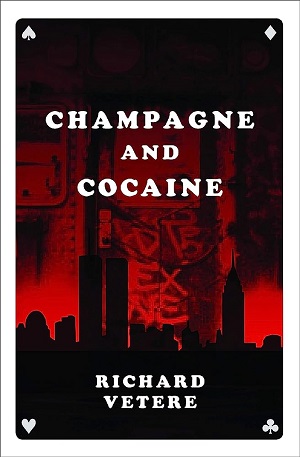 L’Idea Magazine: Could you tell us about your novel “Champagne and Cocaine” and what inspired it? Were you attempting, and might I say successfully, to remove the gloss to the mobster’s world with this novel?
L’Idea Magazine: Could you tell us about your novel “Champagne and Cocaine” and what inspired it? Were you attempting, and might I say successfully, to remove the gloss to the mobster’s world with this novel?
Richard Vetere: My novel Champagne and Cocaine came out of some experiences I had in NYC in the 1980s. The 1980s were a wild and lonely time for me. A long-time relationship ended and I found myself looking to fill the aimlessness. After Vigilante was released to great fanfare I was still without a viable literary agent, so my career oddly stalled. I had friends who had money to spend and only those who lived through the ‘80s would know that money meant cocaine, all-night clubs, and after-hour haunts that lasted into the morning. The novel focuses on a nightclub called Visage, on the West Side, which was really a mob hangout. The women who worked there were young and gorgeous. Many were lost in the big city and searching for careers as actresses. Part of the allure of the club was that the waitress wore revealing uniforms. Everyone was looking for tips in money or drugs to survive. There was an enormous swimming pool hanging from the ceiling where nearly naked young men and women swam and the rest is somewhere between Nirvana and something a lot less hospitable. I first heard the expression champagne and cocaine in Visage and it stuck. I walked around with that title for a decade before a friend told me I had to write the story. Fortunately for me, I never got addicted to drugs. I actually disliked both cocaine and champagne. But it was hard not to get addicted to the all-night parties in Manhattan penthouses. I still can see those ashtrays filled with the white powder. Everyone lived on the edge. It was a time of a certain vitality coupled with a nihilism and hedonistic sensuality. When reading the novel just remember this, I left a lot of crazy stuff out. Some days, I got out of bed at two in the afternoon. Finding myself alone and with nowhere to be, I began to research and write the early drafts of my novel The Third Miracle and my stage play Caravaggio.
“Now the question is, are we still Italian American, or have we become American as the new immigrants see us?”
L’Idea Magazine: You received a grant from the Russo Brothers Film Forum to write, direct and produce a documentary “Where Are We Now? The Italian American Today,” in which appear my friends Anthony Tamburri and Fred Gardaphé, among many others. Could you give us a brief synopsis? Is it available to stream or see at the movies somewhere?
Richard Vetere: My documentary is easy to access by just going to NAFA’s website. I wanted to find out what Italian Americans thought about themselves and I wanted to find out what new immigrants thought of Italian Americans. In making the documentary I was surprised. To the new immigrants, we were part of the status quo. They really didn’t see us as Italian but more like American while 2nd and 3rd generation Italian Americans had a tough time defining what it meant to be Italian other than food and family, which can be said of a lot of immigrants who come here. They also knew nothing about Italy, and many had never even been there! As for me, by interviewing Anthony Tamburri and Fred Gardaphé, I learned a lot more about the Italian American experience than I thought I knew.
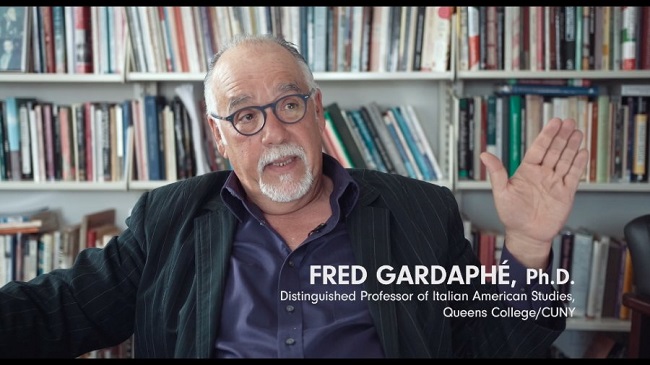
We were not embraced by those already here. Those of us who came here were not the educated. Those who came made a solid place for themselves contributing a lot to this country and its culture. Now the question is, are we still Italian American, or have we become American as the new immigrants see us? That was the question of my documentary. I have to say another great memory in my life along with Caravaggio being produced in Rome, was being asked to be in a float going up 5th Avenue, the center of my city, on Columbus Day. I was in the float with friends Danny Aiello and Tony Danza. It was an honor and my only regret is that my parents weren’t alive to see it. It made me a proud New Yorker with Italian American roots.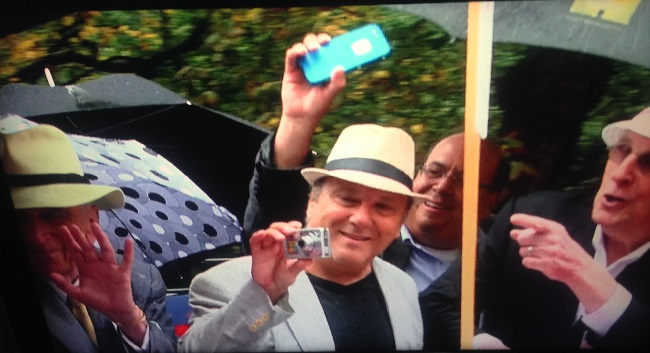
LINK TO A CLIP FROM THE END OF THE DOCUMENTARY
L’Idea Magazine: You also wrote three books of poetry, “Memories of Human Hands,” “A Dream of Angels,” and “The Other Colors in a Snowstorm.” Could you kindly give us an example of your poems? Are these books significant steps in your life as a poet? That is, could they have been written in a different chronological order?
Richard Vetere: I have several favorite poems that I have written over fifty years now. Of course, my favorite is Caravaggio, written in 1978 in response to John Asbery’s poem about Parmigianino titled Self-Portrait in a Convex Mirror. I believe Parmigianino and Ashbery both lacked passion in their work. I had to write my reply, which was my poem about being in the passionate Caravaggio and his painting The Calling of Saint Matthew. It was pointed out to me when I was in my mid-20s that I was there in the painting, a money lender. And if you look at photographs of me when I was younger, that was me! Of course years later, I learned that it was Caravaggio’s roommate Mario Minniti in who I saw myself. It was then that I wrote about him in my published novel Baroque. My poem Caravaggio was published in Two Rivers Review in 2017 and you can also find it in my second book of poetry A Dream of Angels. That is how I got so interested in Caravaggio. It was seeing myself in his painting. I wrote a play about him titled Caravaggio, then the novel Baroque and in 2021, my screenplay adaptation Caravaggio won the Golden Palm at the Beverly Hills International Film Festival for Best Screenplay.
When only twenty-one, I wrote this poem There Is a Stage Somewhere Set. Here is the opening:
“There is a stage somewhere set/ with the warmth of faceless mannequins/ and I, at times, visit this stage to find/ some coherence/ in its music and its sound.”
This poem appears in my book Memories of Human Hands.
Another favorite is my poem On My Forty-Fifth Birthday. It can be found in my book The Other Colors in a Snowstorm.
“In time
writing a mountain of euphoria –
from a table of opulence
flooding my memory.
If you can hear this now
tell your shadow
and all who comfort it
the poet you knew
a hundred years ago
was so very, very fortunate.”
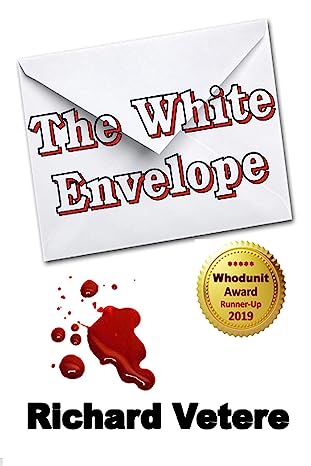 L’Idea Magazine: “The White Envelope” and “I, Human” are two more of your award-winning novels. The genre is Mystery, unlike other novels of yours, and it is so different from your plays, which tend to be comedies. What made you write these novels? Is there a genre you feel more comfortable to write in, regardless of the success your Work may receive?
L’Idea Magazine: “The White Envelope” and “I, Human” are two more of your award-winning novels. The genre is Mystery, unlike other novels of yours, and it is so different from your plays, which tend to be comedies. What made you write these novels? Is there a genre you feel more comfortable to write in, regardless of the success your Work may receive?
Richard Vetere: I didn’t realize I was writing mystery until The Mystery Writers Association pointed it out to me that my novel The Third Miracle was a mystery novel the Association very much respected. The White Envelope was based on a true story. When I was in school in 1963 every Tuesday after school, my mother would send me around the corner up the hill to pick up a white envelope from my aunt. I never knew what was in the envelope and only after my mother had died did I think about it.
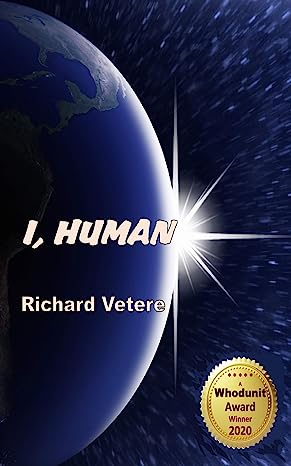 It was then a story slowly emerged in my imagination. I used many people and events in my own life telling that story. I also used time and memory as important elements in the novel in ways I had not done in other books of mine. I, Human is my only venture into science fiction. Of course, I was inspired by I, Robot. Both novels won mystery writer awards in back-to-back years. To answer your question, I am comfortable in all genres, actually. As Joyce says, “Content should dictate style.” That is always my rule. I create a character followed by the story and then the plot. And then the style I will tell it in.
It was then a story slowly emerged in my imagination. I used many people and events in my own life telling that story. I also used time and memory as important elements in the novel in ways I had not done in other books of mine. I, Human is my only venture into science fiction. Of course, I was inspired by I, Robot. Both novels won mystery writer awards in back-to-back years. To answer your question, I am comfortable in all genres, actually. As Joyce says, “Content should dictate style.” That is always my rule. I create a character followed by the story and then the plot. And then the style I will tell it in.
L’Idea Magazine: You also teach in college. What subjects do you teach? Do you feel teaching is very rewarding?
Richard Vetere: When my movie Vigilante came out in 1983, I picked up the phone and called Queens College telling them I just had a movie released and I wanted to teach screenwriting. I was told by the man who answered the phone that I was in luck since the professor teaching that class was retiring. I started immediately. I always wanted to get back into college so being in front of the class was something I really wanted to do. Concerning writing, I wanted to teach structure because I was weak at it. I asked a friend who wrote for The New Yorker if she could recommend a book. Syd Fields’ Screenwriting Workbook was her recommendation and I used it. When I was on a panel discussion on writing with Richard Wesley, he liked a few things I said and then offered me the chance to teach at Tish at NYU. I taught in the master’s program both film and playwrighting. To be frank, I teach to learn. Plain and simple. Also, my classes have a spontaneity to them. It is a give-and-take with the students. I want to know what they are watching and why and share with them my favorite movies and discuss why I like them so much. Just the other day, last semester at Queens College, I said something in my lecture and stopped. After 40 years of talking about movie writing, I realized I had said something I had never thought of before. It was part poetry and part prose, and entirely thrilling. I shared a moment of insight and knowledge. That is what you hope for every time you lecture.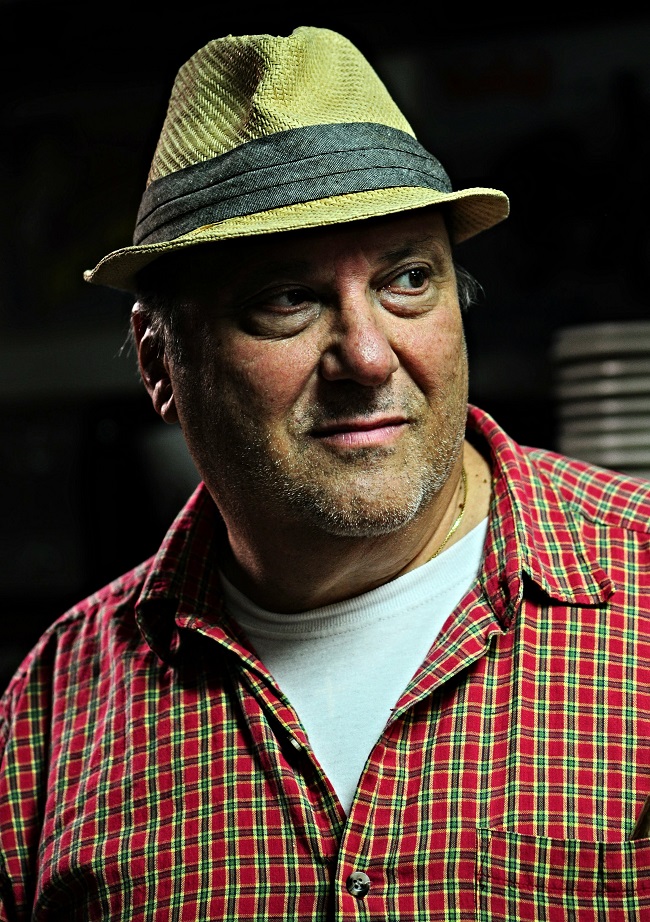
L’Idea Magazine: In 2005, Stony Brook University archived your works and letters from 1967 until 2001. You must have felt honored of their request. What prompted them to contact you and get this done? Do you feel that this demonstrates you are a recognized status symbol of the Italian American society as well as the writing world?
Richard Vetere: I had just returned home from LA where I was writing a TV series for ABC and Disney when I got a letter from the Frank Melville Library at Stony Brook. They wanted to create the Richard Vetere Collection. I am sure Fred Gardaphé recommended me. Was I honored? Yes! And relieved. I had saved over 50 boxes of my letters, and original drafts of plays, novels and stage plays. It was thanks to my mother that she stored them all through the years in the basement of the house I grew up in. And just a couple of years earlier, my good friend Lisa Battista, recorded all the boxes and their contents. So when the archive people showed up with a large van carting everything away, I took a deep breath, relieved knowing all my years of work would be airdried and collected and in safekeeping. PS I believe The Frank Melville Library has run out of room and now I have another twenty years of new work and would love to find a second home for all of those manuscripts.
L’Idea Magazine: Are you working on any new projects at this time?
Richard Vetere: My new novel She’s Not There will be released this Fall 2023. It is a coming-of-age novel set in 1965 when a 14-year-old boy learns that his mother has run away. His father, overwhelmed, sends the boy to live with his sister, the boy’s aunt, in Upstate NY. It is there the boy sees his first cornfield and has his first romance with the extraordinary Sarah. He also learns about the Vietnam War, race riots, and how telling the truth matters. It was inspired by the Zombie hit song of 1965 She’s Not There. I am now looking for reviewers and setting up in-person readings of the novel.
L’Idea Magazine: If you had to define yourself with three adjectives, what would they be?
Richard Vetere: Dedicated, defiant, determined.
L’Idea Magazine: I realize that you have been very successful, but do you still have any unrealized goals or ambitions?
Richard Vetere: I have many goals and ambitions! I am working with the brilliant Polish American actress Maja Wampuszyc, to get my newly published play Zaglada Off-Broadway. We had a world premiere at the Ensemble Stage in North Carolina, in 2022. I am also looking for a publisher for my new novel The Powerful Wings of a Mighty Cherub and I am looking for someone to write a critical biography of my work. I have already published a memoir titled Live Fast, Die Young & Leave a Goodlookin’ Corpse: a memoir of the 1970s. I am currently writing the sequel which encompasses the 80s and 90s as well as more real-life stories from the 70s. I was fortunate to be awarded several writing grants when I was younger. I am anticipating that there are still some awards and critical recognition in the future, which is always appreciated.
L’Idea Magazine: What other interests do you have besides writing and directing? Any hobbies?
Richard Vetere: I have little interest other than writing, directing, acting, lecturing. Right now, I continue to enjoy cultivating friendships that are decades long and new ones with young and old people who bring excitement and laughter to my life. Now, many people I have known have gone and each year others die. I am still looking towards the horizon for new and exciting adventures.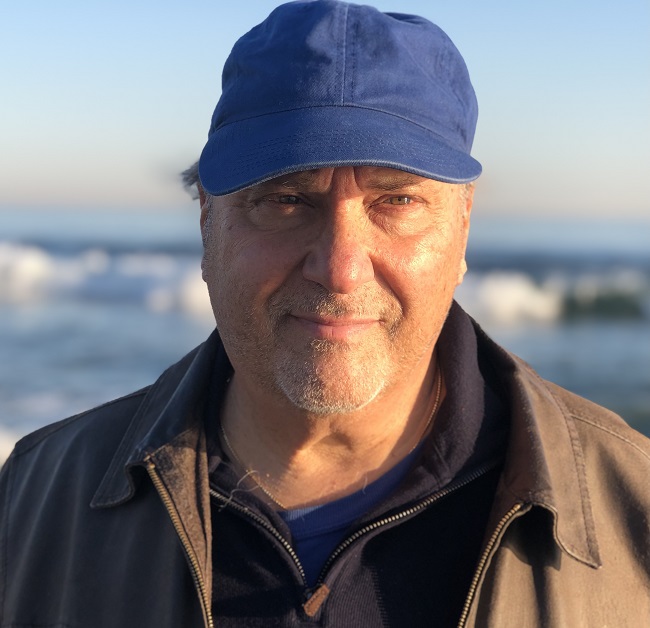
L’Idea Magazine: Where do you see yourself ten years from now?
Richard Vetere: Ten years from now I will be 81. That is a hard notion to contemplate, considering I have to remind myself daily that I am already 71. I swim laps every day during the summer and I do wind sprints in the park every day during the other seasons. I laugh to myself thinking of the Ben Gazzara TV series of my childhood titled Run For Your Life. I do believe, however, that constantly creating is worth every moment you dedicate to it. I’ve been prolific all my creative life. I continue to spend each day like that and have probably created some of my best work in the last ten years.
“If I had to choose one person from the past to speak to, I would like to go back to 1975 when I was twenty-three years old and speak to my younger self.”
L’Idea Magazine: If you had the opportunity to meet and talk to anyone from the past or the present, who would that person be and what would you like to tell him (or her)?
Richard Vetere: If I had to choose one person from the past to speak to, I would like to go back to 1975 when I was twenty-three years old and speak to my younger self. At that time, I had just gotten my master’s degree from Columbia University and I was working as a security guard. I wanted to work at a job I hated so I could force myself to become a writer. I did not want to teach, I did not want a job that would suck the energy from me, I wanted to be a produced playwright, film writer, and a published poet and novelist. I was dating a beautiful, divorced woman, older than me, who thought I was too sensitive for the world. In fact, my entire existence seemed to be hanging on a thread. I was in a panic that my decision to become a living writer was going to be too difficult a path. So, if I could go back to the past, I would sit myself down and tell myself not to panic, not to give in to my fears. I would tell myself to work hard, follow my convictions, maintain my confidence and in doing all this, I would accomplish all I dreamed. I would then smile and tell the young man I once was, that I was who he would become, and tell him to believe me when I say it will all be a wonderful journey. 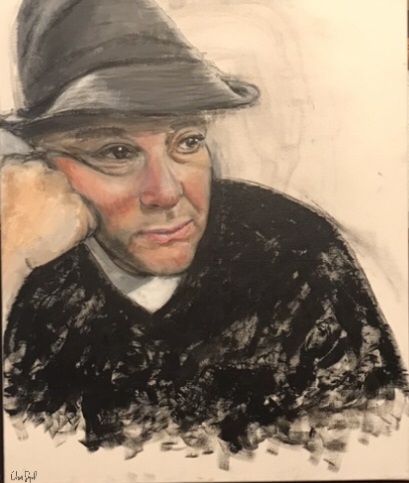
L’Idea Magazine: A message for our readers?
Richard Vetere: Yes, my message is a blatant promotion. If you don’t know all my work, please read the novels, the plays and screen the movies. And let me know what you think by writing to my website. It is always great fun to hear from you.


